A new initiative called “United against food waste” has been launched in the Netherlands. The originator is the Task Force Circular Economy in Food, which consists of a large number of companies, research institutes, civil society organizations and government bodies, including Wageningen University & Research. The task force aims to reduce food waste in the Netherlands by half in 2030 compared to the 2015 figure.
The Dutch Ministry of Agriculture, Nature and Food Quality will provide a total of €7 million over the coming four years to support this objective via investments in innovation, research, monitoring and education.
“Huge amounts of food are being wasted,” claims Carola Schouten, Minister of Agriculture, Nature and Food Quality. “This is especially serious when you consider how widespread poverty remains around the world, even in the Netherlands. There are places where people go to bed hungry. We need to learn how to manage better foodstuffs and the raw materials, labor and energy required for their production and transportation. There are opportunities in this process for many new and innovative ideas and initiatives. Less waste would also allow a significant reduction in CO2 emissions while saving money. In short, it would be good for the environment as well as the finances.”
Agenda against food waste
In recent months, the Circular Economy in Food Task Force has put together a national agenda against food waste that consists of goals reaching until 2030. And the agenda is truly ambitious. At present, a third of the food prepared across the world is wasted. The task force aims to halve this proportion in the Netherlands by 2030. This will boost the country’s pioneering ambition to become the first in Europe to meet Target 12.3 of the United Nations’ Sustainable Development Goals (which calls on all nations to halve food waste and reduce food loss by 2030).
To achieve this goal, a large number of companies, NGOs, research institutes and government bodies have formed a coalition. Together, they will undertake some actions and initiatives to structurally reduce waste from farm to fork in the coming years. More companies will be approached to join to maximize the impact of the task force.
Toine Timmermans, Wageningen University & Research, said: “The members of the task force have worked hard over the past year to give concrete shape to their ambitions and approach. We can be proud of our integrative agenda, with a wide range of partners already forming new partnerships, launching interesting initiatives and achieving real results. The task force shows that, if we all build together, with companies at the helm, it is possible to develop an ecosystem of solutions that will generate economic, environmental and social progress towards achieving the transition to a better and more circular food system.”
Timmermans said: “We have worked for several years on developing the agenda for the Taskforce, driven by the commitments and needs from businesses. The key group consists of 25 businesses, from innovative SME to global multinationals, across the supply chain. The agenda consisted of 4 focus areas [see infographic].”
“We aim to have 200 member companies at the end of 2019.”
“Last year we have worked together with these companies on the development and implementation of solutions. And at our launching event last Tuesday several results have been shared, and new launches introduced. The technology and solutions are not the limiting factors in reducing food waste. It is much a behavioral issue,” he explains.
The Minister of Agriculture, Nature and Food Quality Carola Schouten has announced financial support for the task force. This will be used for monitoring, research, innovation & business cases, campaigning and creating an inventory of laws & regulations.
The Circular Economy in Food Task Force has 25 members, including Rabobank, the Ministry of Agriculture, Nature & Food Quality, McDonald's Netherlands, Voedingscentrum, Hutten Catering, Protix and Wageningen University & Research. While the theme of food waste has long been on the political agenda, this is the first time that such a large-scale partnership covering the entire food chain has been formed, and with such major ambitions.
